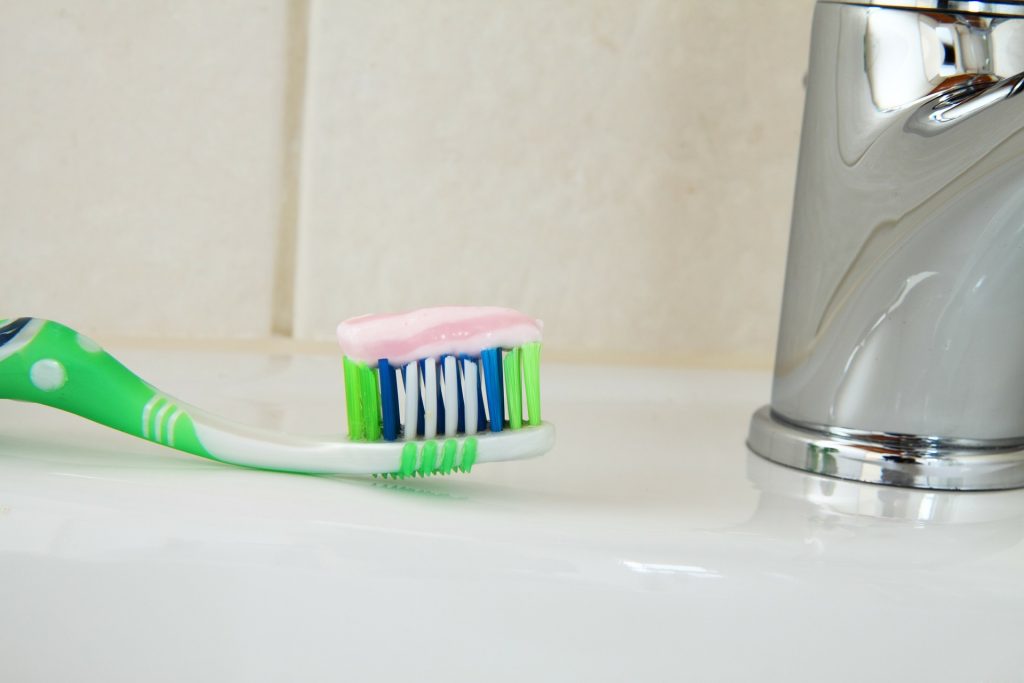 Fluoride is used extensively as an agent to prevent dental caries. In this regard, the mainstream accepted mechanism of action derives from the ability of fluoride to cause remineralisation of tooth enamel, which hardens the teeth and prevents the development of dental caries. This caries is caused by the presence of bacteria in the mouth such as streptococcus, that consume food from the diet of the individual and as a result of metabolic activity decrease the pH of the mouth. The acidic byproduct of their metabolism demineralise the enamel of the teeth and creates dental caries, which are just holes in the enamel of the teeth. As the streptococcus bacteria can generate large amounts of energy and replicate quickly using sugars as a source of energy, sugar in the diet increases the rate of formation of dental caries significantly. The ability of acid conditions to cause demineralisation is evidenced by the currently accepted model of bone demineralisation in osteoporosis, that derives from acidification of the blood through poor diet.
Fluoride is used extensively as an agent to prevent dental caries. In this regard, the mainstream accepted mechanism of action derives from the ability of fluoride to cause remineralisation of tooth enamel, which hardens the teeth and prevents the development of dental caries. This caries is caused by the presence of bacteria in the mouth such as streptococcus, that consume food from the diet of the individual and as a result of metabolic activity decrease the pH of the mouth. The acidic byproduct of their metabolism demineralise the enamel of the teeth and creates dental caries, which are just holes in the enamel of the teeth. As the streptococcus bacteria can generate large amounts of energy and replicate quickly using sugars as a source of energy, sugar in the diet increases the rate of formation of dental caries significantly. The ability of acid conditions to cause demineralisation is evidenced by the currently accepted model of bone demineralisation in osteoporosis, that derives from acidification of the blood through poor diet.

Fluoride is an effective antimicrobial agent. In this regard, fluoride has a number of mechanisms by which it can effectively kill cells including the streptococcus bacteria that cause dental caries. Firstly, fluoride can inhibit a number of glycolytic enzymes, including enolase. This decreases energy production and prevents the bacteria replicating. This inhibition is likely irreversible, which means that once the enzyme is inhibited, it is not able to continue its catalytic activity. Secondly, fluoride can also inhibit certain of the proteins proton pumps (F-ATPases) involved in energy production across cell membranes. This again has the effect of inhibiting energy production and preventing bacterial replication. Thirdly, fluoride is able to disrupt cell membranes, which destroys cells through a total breakdown in membrane transport systems and cellular homeostasis. In these three ways fluoride is an effective antimicrobial that is able to inhibit the growth of bacteria that cause dental caries.
However, this use is controversial because the efficacy of fluoride to mineralise teeth has not been conclusively evidenced. Also there is controversy as to whether fluoride can be applied directly to teeth as a topical agent or has to be ingested. That fact that these inconsistencies exist and that no mechanism can be explained using this model suggests that the actual mechanism by which fluoride might protect teeth has been largely ignored. In fact, fluoride is a highly effective antimicrobial agent, and has been evidenced to kill the streptococcus bacteria that cause dental caries at levels below that which is present in dental products. Therefore the possibility exists that fluoride is a simple poison that can kill the detrimental bacteria that cause dental caries. This would explain the efficacy of topical application of fluoride, something that is not explainable using the mineralisation model. It would also explain the efficacy of certain food component at preventing dental caries, these components being antimicrobial agents.
Eat Well, Stay Healthy, Protect Yourself
RdB
